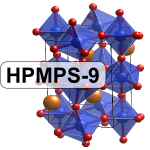Author index > Jacobsen Steven
Silicates, comprising more than 90% of the Earth's crust, are one of the most fundamental and widespread mineral groups, whose behaviours under pressure are of long-standing interest. The investigation of physical and chemical properties of silicates gives a key for the explanation of the corresponding behaviours and properties of the Earth's crust and mantle, and furthermore Cu-based silicates enjoy the attention of researchers working in the fields of geology and mineralogy. Here, we have studied the compressional behaviours of dioptase up to ~20 GPa at room temperature. A pressure-induced phase transition was studied on single-crystal using synchrotron X-ray diffraction and Raman spectroscopy. Synchrotron X-ray diffraction was carried out at the 13 BMC beamline (GSECARS) of the Advanced Photon Source. By analyzing high pressure behaviours of aqueous silicate minerals, we come to the conclusion that the form of water molecules plays a key role in the elasticity of annular silicate minerals. Knowledge of dioptase crystal chemistry will contribute more broadly to the stability of hydrous silicates and the field of mineralogy.
|


 PDF version
PDF version